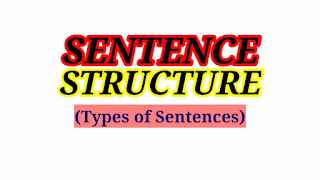Sentence structure
SENTENCE STRUCTURE
Key Points:
WHAT IS SENTENCE ?
TYPES OF SENTENCES (According to Function)
1. Assertive Sentences
2. Interrogative Sentences
3. Imperative Sentences
4. Optative Sentences
5. Exclamatory Sentences
TYPES OF SENTENCES (According to Construction)
1. Simple Sentence
2. Compound Sentence
3. Complex Sentence
In this post we discuss sentence and their types according to function and according to construction in details. So please keep with us.
WHAT IS SENTENCE?
Simple Sentence:
We use words when we speak or write. We have to use words in groups because isolated words do net make complete sense. When words are grouped, they become sentences. Those groups of words which make complete sense are called sentences. A sentence which has a subject and a predicate.
For example.
He runs fast.
Phrase:
Then some groups of words do not make complete sense. Such groups are called phrases.
For example:
He succeeded in the long run.
Clause:
The groups of words, which make complete sense and has a subject of predicate but are not a full sentence rather part of the larger sentence (compound or complex) are called clauses.
For example:
Birds fly and fish swim.
Five Types of Sentences according to Function:
1. Assertive Sentences
2. Interrogative Sentences
3. Imperative Sentences
4. Exclamatory Sentences
5. Optative Sentences
1. Assertive Sentences;
The sentences which make assertions or statements are called Assertive sentences. These may be affirmative, negative or emphatic.
For example:
(1) We believe in one God. (Affirmative)
(2) He does not pay his duty. (Negative)
(3) I did send this message. (Emphatic)
A Positive statement is said to an Affirmative sentence, a statement which is not positive is called a Negative Sentence. The statement which is forceful or lays emphasis on something is called an Emphatic Sentence.
2. Interrogative Sentences:
The sentences which ask questions(?) are called Interrogative Sentences. Always a question mark is put at the end of the interrogative sentence.
For example:
(1) What is your name?
(ii) Did he pass the examination?
(iii) Will you accompany me to Lahore?
(iv) May I come in, Sir?
(v) Has she prepared tea?
3.Imperative Sentences:
The Imperative sentence expresses command, advice or request. It belongs with the first form of the verb. Subject is missing "You" subject is understand.
For example:
(i) Get away from here. (command)
(ii) Speak the truth. (advice)
(iii) Please help me. (request)
4. Optative Sentences:
The sentences which express a pray, curse, or a desire are called optative sentences.
For example:
1-May you five long!
2-May he fail M the examination!
3-May we were loyal to our country!
5- Exclamatory Sentences:
The sentences which express the sudden and strong feelings or emotions or wish are called Exclamatory Sentences:
For example:
(I)What a beautiful flower!
(ii) Hurrah! We have won the match.
(iii) Alas! I am ruined.
(iv) If only I were a millionaire!
Let's we practice some examples and try to recognize the following sentences.
EXERCISE NO.1
1. The sun rises n the east.
2. I do not like his bad habits.
3. Where does he live now-a-days?
4. It is raining.
5. Would that he were honest!
6. He does come here.
7. Hurrah! I have won the first prize.
8. May you get better soon!
9. Complete your work in time.
10. Please solve this sum.
Classification of Sentences according to Structure:
1. Simple Sentence
2. Compound Sentence
3. Complex Sentence
Simple Sentence:
If a sentence expresses one thought and has only one finite, verb, it is called a simple sentences: it has one subject and one predicate,
For example:
Aslam apposes terrorism
Compound Sentence:
If a sentence expresses more than one thoughts and has one principal and one or more than one co-ordinate clauses then it is called compound sentence. Coordinating clauses are joined by coordinating conjunctions.
For example:
I went to bazaar and bought books.
Complex Sentence:
A sentence which expresses more than one thoughts and has one principal clause and one or more subordinate clauses; it is called a Complex sentence. All complex sentences are joined by subordinating conjunctions.
When it will rain, the prices will come down.
They rested when evening came.
Parts of a Sentence:
The sentence has two parts: Subject and Predicate. The topic of a sentence is the subject or the subject is that person or thing about whom which something is said. What is said about the subject is the predicate.
Subject Predicate
The teacher taught the students
Allama lqbal gave the idea of Pakistan
Government
College Lahore produced many great personalities.
The Position of the Subject and the Predicate in the Sentence:
Normally the subject of the sentence comes first. But occasionally for the purpose of emphasis, the natural word order is changed so that the predicate comes first.
For example:
The hero appeared to save his beloved. (no emphasis) To save his beloved appeared the hero.(emphasis on the predicate which comes first).
EXERCISE NO. 2
Separate the Subject and the Predicate in the following or given sentence:
1. The principal set aside this application.
2 The Ouaid-e-Azam founded a new state.
3. The farmer has reaped the crop.
4. He married a poor girl.
5. The boys decorated their class-room.
6. The government did not control price-rise.
7. Columbus discovered America.
8. uprose the morning sun. .
9 To see you I fell delight.
10. Is your father coming today?
11. An evil-doer needs no excuse.
12. On the top of the hill we hoisted the flag.
13. The earth moves round the sun.
14. Against us he plotted.
15. A bad man massacred the innocent person.





Comments
Post a Comment